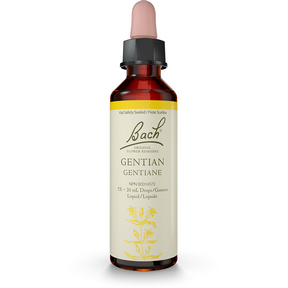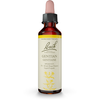For those with an attitude of doubt, pessimism, or discouragement. Gentian promotes the return of optimism. A small herbaceous plant, bitter or autumn gentian blooms in late summer and grows mainly on alpine hills. Its lilac-purple flowers, whose petals form a star, open or close depending on the weather. They remain on the plant when they have wilted, giving it a somewhat sad appearance. Like other gentians, the one chosen by Bach has a root rich in bitter compounds, widely used to treat digestive problems. Gentian belongs to the group of personality types defined by Bach. It concerns characters with deep-rooted negativity, who first see the bad side of a situation, rather than the good, as if they could never fully digest what happens. Generally speaking, the flower is for those who become discouraged easily and doubt that they can continue what they have undertaken. For those who give up at the first failure, whether academic or not, or who are in a hurry to get better when they are ill. In the words of Bach, "this plant will give you courage on every occasion, will make you understand that failure does not exist when you do your utmost, whatever the result." "For those who become discouraged easily. Even if they make good progress, in their health, their business, their daily life, the slightest delay or the smallest obstacle will cause doubt and make them lose their enthusiasm." Excerpt from the 1936 edition of "The Twelve Healers", translated into French by C. Lévi and G. Wolf.
Adults: 2 drops in a glass of water or on the tongue 4 times a day.
Non-medicinal ingredients: Grape alcohol 27% v/v, aqueous solution of Gentianella Amarella flowers (dilution 1/500).

